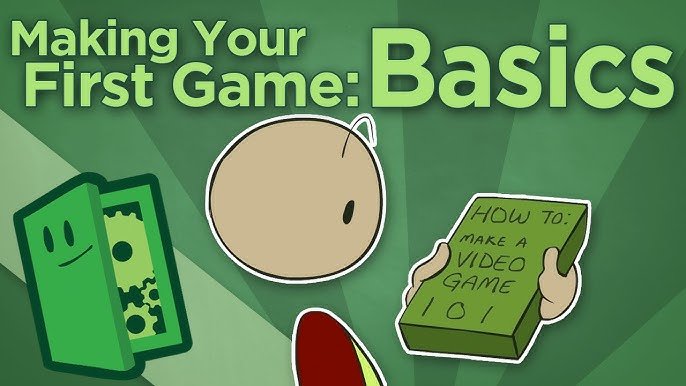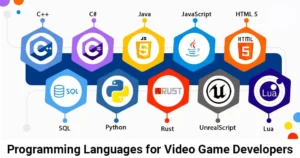Video games have changed from simple, graphical adventures to worlds that are so real that millions of people play them every day. But every game, from small independent projects to big box office hits, started with one person or a small group of people working together. For people who have never made a game before, the idea may seem impossible. It can be too much to handle all at once to code, create, make art, and tell a story. Anyone who is creative and persistent can make their first game today, thanks to all the tools, resources, and helpful groups out there.
This guide for beginners will teach you the basics of making games, from learning the basic ideas to making your first project that can be played. You can use the information in this piece to start your journey, whether you want to make a fun side project or the next big thing.
Getting to Know the Basics of Making Games
Understanding what game creation is all about is important before you start working on games. At its core, game creation is the process of planning, creating, and making fun interactive experiences for people to enjoy. A game is more than just pretty pictures; it’s also about how it works, how it tells a story, and how it keeps the player interested.
Several things come together to make a game:
- It’s the rules, goals, and features of a game that determine how the person interacts with it.
- Writing the code that makes the game’s features and logic work is called programming.
- Art and motion are things that you can see, like figures, settings, and user interfaces.
- Sound and music: Sounds that make you feel like you’re really there and set the scene.
- Testing and iteration: Making changes to the game to fix bugs and make it more fun to play.
For now, you don’t need to learn all of these at the same time. A lot of tools make it easy to try things out and learn as you go.
How to Pick the Best Game Engine
Choosing a game engine, the software that lets you build your game, is one of the first big choices you’ll have to make. Game systems take care of a lot of the technical stuff, so you can focus on being creative. Here are some famous choices that are good for beginners:
- Unity: This program is used for both personal and business projects, and it can make both 2D and 3D games. Scripting is done in C#, and it has a huge community with a lot of lessons.
- Unreal Engine: This engine is famous for having beautiful graphics, and it has Blueprints, a visual writing system that makes it easy for people who don’t know how to code to make things.
- Godot is a free, open-source engine that is easy to learn and doesn’t take up much space. It has its own programming language called GDScript that is easy for beginners to learn.
- Construct or GameMaker are great for people who are just starting out and want to make 2D games with little to no coding.
You should choose the best engine based on your needs. Unity or Unreal might be the best choices if you want to learn more about 3D graphics. Godot or Construct are great places to start for smaller 2D projects.
Getting Started with Coding
Even though some systems have visible writing, you will have a lot more options if you know at least the basics of code. When you code, you can add your own features and make your own ideas come to life.
The most popular languages used to make games for newbies are
- In C# (Unity)
- For Unreal Engine, C++
- GDScript (Godot)
- JavaScript or Python (it depends on the system)
You don’t have to learn how to code quickly. To begin, learn basic ideas such as variables, loops, and conditionals. Online, you can find a lot of free classes and guides. Practicing will help you understand how the code in your game works.
Beginning Small: Making Your First Game
Beginners usually make the mistake of setting goals that are too big too soon. Start with a simple job before making the next open-world RPG. Some classic examples are:
- A simple platform game where the player jumps over things that are in the way.
- A simple board game like Tic-Tac-Toe.
- A 2D shooter with simple monsters and ways to score.
- You can learn the whole process by starting small: planning, building, trying, and ending. Finishing a small job is more fun and informative than giving up on a big one that you can’t finish.
What does the game do to praise or punish people?
Game rules don’t need to be hard to understand. In fact, a lot of the most popular games are successful because they have easy rules that are fun to play. For instance, Flappy Bird was very easy to make but became a huge hit all over the world. Make sure your first game is fun and simple.
Adding Sound and Art
A lot of what makes a game fun is how it looks and sounds. As a beginner, don’t stress about making art that looks like it was made by a pro right away. Sites like OpenGameArt and itch.io have free tools that you can use. In the same way, it’s easy to find free music and sound effects.
You can play around with your own art and sound design as you gain skill. But for now, stress how well it works and how much fun it is to play over how well the pictures look.
Checking out and making your game better
Testing is an important part of creation. You should play your game over and over to find bugs, glitches, or places that don’t make sense. Have family or friends play with you too—they might find problems you missed.
Iteration means making changes to your game based on what people say about it. Making small changes, like changing the amount of challenge or improving the settings, can have a big effect.
Putting out your first game
You can share your game with the world once it’s finished and ready to play. Itch.io, Game Jolt, and even the Google Play Store are great places to share small projects. Publishing gives you feedback from real people, which is helpful, and it also boosts your courage to take on bigger projects.
FAQs
1Do I need to know how to code to make a game?
Not all the time. You can make games without knowing how to code with systems like Construct, GameMaker, and Unreal Engine (with Blueprints). Learning basic code, on the other hand, will let you be more creative.
What’s the length of time it takes to make a game?
It depends on how hard it is. Making a simple 2D game could take days or weeks, but bigger projects could take months or even years. People who are just starting out should do easy jobs that they can finish quickly.
What kind of computer do I need to make games?
Most computers today can run programs that are easy for beginners to use, like Godot or Unity. It is suggested that you use a more powerful computer when working on 3D projects with Unreal.
Can my first game make me money?
It’s possible, but not certain. A lot of new developers put out free games to learn and get experience. Games can make money over time through sales, ads, or donations.
Where can I find out more about making games?
Online, you can find a huge amount of information, such as YouTube lessons, Udemy classes, and sites like r/gamedev on Reddit. Getting involved in groups can help you learn faster and better.
In conclusion
At first, making games might seem hard, but with today’s tools and resources, anyone can make their own. You can make a fun and satisfying project if you start small, pick the right engine, learn the basics of code, and focus on the games. As the saying goes, “every developer starts somewhere.” Making your first game is a great way to get creative and maybe even build a job in the gaming industry.
Don’t be afraid to start small, and remember that every great game starts with a simple idea.




